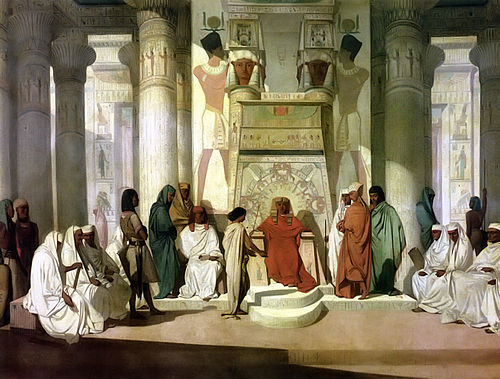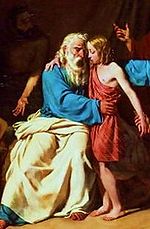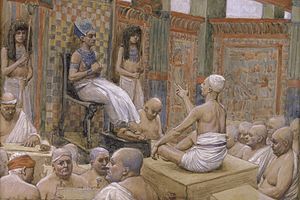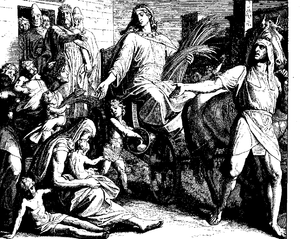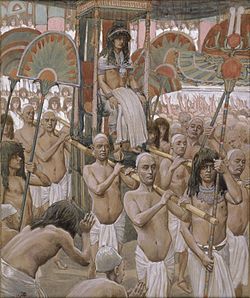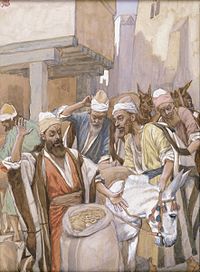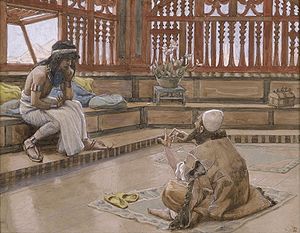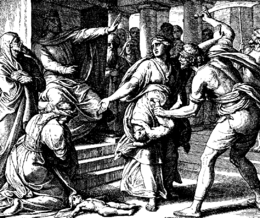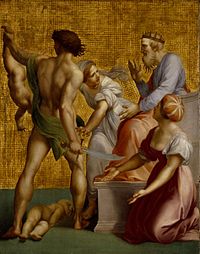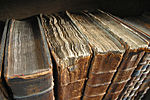- Miketz
-
Miketz or Mikeitz (מקץ — Hebrew for “at the end,” the second word — and first distinctive word — of the parashah) is the tenth weekly Torah portion (parashah) in the annual Jewish cycle of Torah reading. It constitutes Genesis 41:1–44:17. Jews in the Diaspora read it the tenth Sabbath after Simchat Torah. Generally, it is read on the Sabbath of Chanukah. When Chanukah contains two Sabbaths, it is read on the second. In some years, however, Miketz is read on the Sabbath after Chanukah.
Contents
Summary
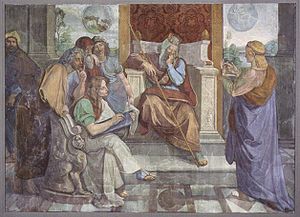 Joseph Interprets Pharaoh's Dream (fresco circa 1816–1817 by Peter von Cornelius)
Joseph Interprets Pharaoh's Dream (fresco circa 1816–1817 by Peter von Cornelius)
Pharaoh’s dream
Pharaoh dreamed that he stood by the river, and out came seven fat cattle, who fed in the reed-grass. (Genesis 41:1–2.) And then seven lean cattle came up out of the river and ate the seven fat cattle, and Pharaoh awoke. (Genesis 41:3–4.) He went back to sleep and dreamed that seven good ears of corn came up on one stalk, and then seven thin ears sprung up after them and swallowed the good ears, and Pharaoh again awoke. (Genesis 41:5–7.)
In the morning, Pharaoh was troubled and sent for all the magicians and wise men of Egypt and told them his dream, but none could interpret it. (Genesis 41:8.) Then the chief butler spoke up, confessing his faults and relating how Pharaoh had put him in prison with the baker, and a Hebrew there had interpreted their dreams, correctly predicting the future. (Genesis 41:9–13.) Pharaoh sent for Joseph, who shaved, changed clothes, and came to Pharaoh. (Genesis 41:14.) Pharaoh told Joseph that he had had a dream that none could interpret and had heard that Joseph could interpret dreams, but Joseph said that God would give Pharaoh an answer of peace. (Genesis 41:15–16.)
Pharaoh told Joseph his dreams, and Joseph told him that the two dreams were one, a prediction of what God was about to do. (Genesis 41:17–25.) The seven good cattle and the seven good ears symbolized seven years of plenty, and the seven lean cattle and the seven empty ears symbolized seven years of famine that would consume thereafter. (Genesis 41:26–31.) The dream was doubled because God had established the thing and would shortly bring it to pass. (Genesis 41:32.) Joseph recommended that Pharaoh set over Egypt a man discreet and wise, that he appoint overseers to take up a fifth of the harvests during the years of plenty, and that he store that food for the years of famine. (Genesis 41:33–36.) Pharaoh told Joseph that inasmuch as God had shown him all this, there was none so discreet and wise as Joseph, and thus Pharaoh set Joseph over all the land of Egypt. (Genesis 41:39–41.) Pharaoh gave Joseph his signet ring, fine linen, a gold chain about his neck, and his second chariot, and had people cry before him “Abrech.” (Genesis 41:42–43.) And Pharaoh renamed Joseph Zaphenath-paneah and gave him Asenath the daughter of Potipherah priest of On to be his wife. (Genesis 41:44–45.)
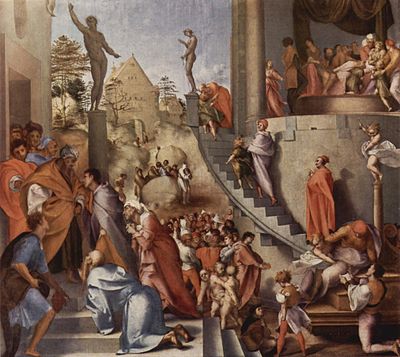 Joseph in Egypt (painting circa 1517–1518 by Pontormo)
Joseph in Egypt (painting circa 1517–1518 by Pontormo)
Joseph the provider
Joseph was 30 years old when he stood before Pharaoh, and in the seven years of plenty he gathered up grain as plentiful as the sand of the sea. (Genesis 41:46–49.) Joseph and Asenath had two sons, the first of whom Joseph called Manasseh, for God had made him forget all his toil and all his father's house, and the second of whom he called Ephraim, for God had made him fruitful in the land of his affliction. (Genesis 41:50–52.) The seven years of plenty ended and famine struck, and when Egypt was famished, Joseph opened the storehouses, and sold food to the Egyptians. (Genesis 41:53–56.) People from all countries came to Egypt to buy grain, because the famine struck all the earth. (Genesis 41:57.)
Joseph’s brothers journey to Egypt
Jacob saw that there was grain in Egypt, asked his sons why they sat around looking at each other, and sent them down to Egypt to buy some. (Genesis 42:1–2.) Ten of Joseph's brothers went down to Egypt, but Jacob kept Benjamin behind, so that no harm might befall him. (Genesis 42:3–4.) Joseph's brothers came to buy grain from Joseph and bowed down to him with their faces to the earth. (Genesis 42:5–6.) Joseph recognized his brothers, but they did not recognize him, for he made himself strange to them and spoke roughly with them. (Genesis 42:7–8.)
Joseph remembered his dreams, and accused them of being spies. (Genesis 42:9.) But they protested that they were not spies, but upright men come to buy food, ten sons of a man who had twelve sons, lost one, and kept one behind. (Genesis 42:10–13.) Joseph told them that to prove their story, they would have to send one of them to fetch their brother, and he imprisoned them for three days. (Genesis 42:15–17.) On the third day, Joseph told them that because he feared God, he would allow them to prove themselves by letting one of them be bound in prison while the others carried grain to their houses and brought their youngest brother to Egypt. (Genesis 42:18–20.) They said to one another that surely they were guilty concerning their brother, and so now this distress had come upon them. (Genesis 42:21.) Reuben said that he had told them not to sin against their brother, but they had not listened. (Genesis 42:22.) They did not realize that Joseph understood them, for he used an interpreter, and Joseph turned aside and wept. (Genesis 42:23–24.) When Joseph returned, he bound Simeon before their eyes, and commanded that their vessels be filled with grain and that their money be restored to their sacks. (Genesis 42:24–25.)
They loaded their donkeys and departed. (Genesis 42:26.) When they came to a lodging-place, one of them opened his sack and found his money, and their spirits fell, wondering what God had done to them. (Genesis 42:27–28.) They went home and told Jacob all that had happened, and Jacob accused them of bereaving him of his children, first Joseph and now Simeon, and told them that they would not take Benjamin away. (Genesis 42:29–36.) Reuben answered that Jacob could kill Reuben’s two sons if Reuben failed to bring Benjamin back, but Jacob insisted that his son would not go down with them, for Joseph was dead and only he was left, and if harm befall Benjamin then it would be the death of Jacob. (Genesis 42:37–38.)
The famine continued, and Jacob told the brothers to buy more grain. (Genesis 43:1–2.) But Judah reminded Jacob that the man had warned them that they could not see his face unless their brother came with them, so if Jacob sent their brother they could buy food, but if Jacob did not send him they could not go. (Genesis 43:3–5.) Jacob asked them why they had treated him so ill as to tell the man that they had a brother. (Genesis 43:6.) They explained that the man asked them directly about their kindred, whether their father was alive, and whether they had another brother, and they answered him; how were they to know that he would ask them to bring their brother down? (Genesis 43:7.) Judah then asked Jacob to send the lad with him, so that they could go and the family could live, and Judah would serve as surety for him, for they could have been to Egypt and back by then if they had not lingered. (Genesis 43:8–10.) Relenting, Jacob directed them to take a present for the man, double money in case the return of their payment was an oversight, and also their brother, and Jacob prayed that God might show them mercy before the man and that he might release Simeon and Benjamin to them. (Genesis 43:11–14.)
The brothers return to Egypt
The brothers went to Joseph, and when he saw Benjamin with them, he directed his steward to bring the men into the house and prepare a meal for him to eat with them at noon. (Genesis 43:15–16.) When the brothers were conducted into Joseph's house, they grew afraid that Joseph was going to hold them as bondmen because they had taken the money that they found in their sacks. (Genesis 43:17–18.) So they explained to Joseph's steward how they had discovered their money returned to them and had brought it back with them, plus more money to buy grain. (Genesis 43:19–22.) But the steward told them not to fear, for their God had given them treasure in their sacks; he had their money. (Genesis 43:23.) The steward brought Simeon out to them, brought them into Joseph's house, gave them water, and fed their donkeys. (Genesis 43:23–24.) When Joseph came home, they brought their present and bowed down to him. (Genesis 43:25–26.) Joseph asked after their welfare and that of their father. (Genesis 43:27.) They said that Joseph’s servant their father was well, and they bowed their heads. (Genesis 43:28.) Joseph looked upon Benjamin and asked them whether this was their youngest brother of whom they had spoken, and he prayed that God would be gracious to Benjamin. (Genesis 43:29.) Joseph left hastily for his chamber and wept, washed his face, returned, and called for the servants to serve the meal. (Genesis 43:30–31.)
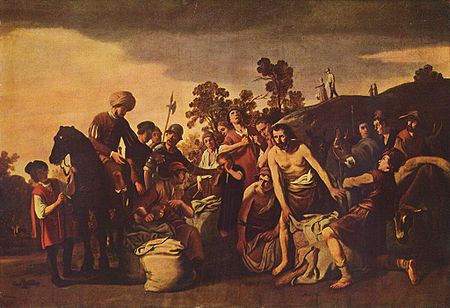 Joseph’s Steward Finds the Cup in Benjamin's Sack (1627 painting by Claes Corneliszoon Moeyaert)
Joseph’s Steward Finds the Cup in Benjamin's Sack (1627 painting by Claes Corneliszoon Moeyaert)
Joseph sat by himself, the brothers sat by themselves, and the Egyptians sat by themselves, because it was an abomination to the Egyptians to eat with the Hebrews. (Genesis 43:32.) The brothers marveled that the servants had seated them according to their age. (Genesis 43:33.) And Benjamin's portion was five times so much as any of his brothers’. (Genesis 43:34.)
Joseph directed the steward to fill the men's sacks with as much food as they could carry, put every man's money in his sack, and put Joseph’s silver goblet in the youngest one’s sack. (Genesis 44:1–2.) At dawn, the brothers were sent away, but when they had not yet gone far from the city, Joseph directed his steward to overtake them and ask them why they had rewarded evil for good and taken the goblet with which Joseph drank and divined. (Genesis 44:3–6.) They asked the steward why he accused them, as they had brought back the money that they had found in their sacks, and they volunteered that the one with whom the goblet was found would die, and the brothers would become bondmen. (Genesis 44:7–9.) The steward agreed, with the amendment that the one with whom it was found would be a bondman and the others would go free. (Genesis 44:10.) Hastily, every man opened his sack, starting with the eldest, and they found the goblet in Benjamin's sack. (Genesis 44:11–12.) They rent their clothes, loaded their donkeys, and returned to the city. (Genesis 44:13.) Judah and his brothers came to Joseph's house and fell before him on the ground. (Genesis 44:14.) Joseph asked them what they had done, did they not know that a man such as he would divine? (Genesis 44:15.) Judah asked how they could clear themselves when God had found out their iniquity; they were all Joseph’s bondmen. (Genesis 44:16.) But Joseph insisted that only the man in whose hand the goblet was found would be his bondman, and the others could go in peace to their father. (Genesis 44:17.)
In inner-Biblical interpretation
Genesis chapter 41
In Genesis 41:15, Pharaoh told Joseph that Pharaoh had heard that Joseph could interpret dreams, and in Genesis 41:16, Joseph replied: “It is not in me; God will give Pharaoh an answer of peace.” Similarly, in Daniel 2:26, King Nebuchadnezzar asked Daniel whether Daniel could interpret dreams, and in Daniel 2:27–28, Daniel replied: “'The secret which the king has asked can neither wise men, enchanters, magicians, nor astrologers, declare to the king; but there is a God in heaven Who reveals secrets, and He has made known to the king Nebuchadnezzar what shall be in the end of days.”
Genesis chapter 42
In Genesis 44:19–23, Judah retells the events first told in Genesis 42:7–20.
The Narator in Genesis 42 Judah in Genesis 44 7And Joseph saw his brethren, and he knew them, but made himself strange to them, and spoke roughly with them; and he said to them: “From where do you come?” And they said: “From the land of Canaan to buy food.” 8And Joseph knew his brethren, but they did not know him. 9And Joseph remembered the dreams that he dreamed of them, and said to them: “You are spies; to see the nakedness of the land you are come.” 10And they said to him: “No, my lord, but to buy food are your servants come. 11We are all one man's sons; we are upright men; your servants are no spies.” 12And he said to them: “No, but to see the nakedness of the land you are come.” 19My lord asked his servants, saying: “Have you a father, or a brother?” 13And they said: “We your servants are twelve brethren, the sons of one man in the land of Canaan; and, behold, the youngest is this day with our father, and one is not.” 20And we said to my lord: “We have a father, an old man, and a child of his old age, a little one; and his brother is dead, and he alone is left of his mother, and his father loves him.” 14And Joseph said to them: “That is it that I spoke to you, saying: You are spies. 15Hereby you shall be proved, as Pharaoh lives, you shall not go there, unless your youngest brother comes here. 16Send one of you, and let him fetch your brother, and you shall be bound, that your words may be proved, whether there be truth in you; or else, as Pharaoh lives, surely you are spies.” 17And he put them all together into ward three days. 18And Joseph said to them the third day. “This do, and live; for I fear God: 19if you aree upright men, let one of your brethren be bound in your prison-house; but go, carry corn for the famine of your houses; 20and bring your youngest brother to me; so shall your words be verified, and you shall not die.” And they did so. 21And you said to your servants: “Bring him down to me, that I may set mine eyes upon him.” 22And we said to my lord: “The lad cannot leave his father; for if he should leave his father, his father would die.” 23And you said to your servants: “Except your youngest brother come down with you, you shall see my face no more.” In early nonrabbinic interpretation
Genesis chapter 44
Philo observed that having attained authority and presented with the opportunity for revenge for the ill-treatment that he had received, Joseph nonetheless bore what happened with self-restraint and governed himself. (On Joseph 28:166.)
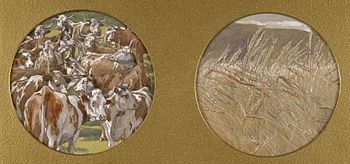 Pharaoh's Dreams (watercolor circa 1896–1902 by James Tissot)
Pharaoh's Dreams (watercolor circa 1896–1902 by James Tissot)
In classical rabbinic interpretation
Genesis chapter 41
The Gemara noted that the words “two years of days (יָמִים, yamim)” in Genesis 41:1 means two years. (Babylonian Talmud Nazir 5a.)
Rabbi Johanan taught that the wicked stand over their gods, as Genesis 41:1 says, “And Pharaoh dreamed, and, behold, he stood over the river.” (The Egyptians worshiped the Nile as a god.) But God stands over them, as Genesis 28:13 says, “and, behold, the Lord stood over him.” (Thus, idolaters must stand over and protect their idols, but God protects God’s people.) (Genesis Rabbah 69:3.)
Reading in Genesis 41:8 that Pharaoh “sent and called for all the magicians of Egypt . . . but there was none that could interpret them for Pharaoh, Rabbi Joshua of Siknin taught in Rabbi Levi's name that there were indeed interpreters of the dream, but their interpretations were unacceptable to Pharaoh (and thus “there were none . . . for Pharaoh”). For example, the magicians said that the seven good cows meant that Pharaoh would have seven daughters and the seven ill-favored cows meant that Pharaoh would bury seven daughters. They told Pharaoh that the seven full ears of corn meant that Pharaoh would conquer seven provinces and the seven thin ears meant that seven provinces would revolt against him. Thus Rabbi Joshua concluded that the words of Proverbs 14:6, “A scorner seeks wisdom, and finds it not,” applied to Pharaoh’s magicians, while the continuation of the verse, “But knowledge is easy for him who has discernment,” applied to Joseph. (Genesis Rabbah 89:6.)
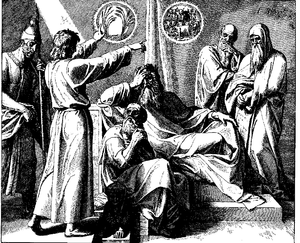 Joseph Interprets Pharaoh’s Dream (woodcut by Julius Schnorr von Carolsfeld from the 1860 Die Bibel in Bildern)
Joseph Interprets Pharaoh’s Dream (woodcut by Julius Schnorr von Carolsfeld from the 1860 Die Bibel in Bildern)
Rabbi Hiyya bar Abba said in the name of Rabbi Johanan that God intervened to cause Pharaoh to be angry with his servants, the chief cupbearer and the baker, in order to fulfill the fate of a righteous man, Joseph, in Genesis 41:12. (Babylonian Talmud Megillah 13b.)
Rabbi Bana’ah argued that the import — and potential prophetic nature — of a dream on the waking world follows its interpretation. Rabbi Eleazar found Biblical support for the proposition in the chief cupbearer’s words about Joseph in Genesis 41:13, “As he interpreted for us, so it came to pass.” Rava added a qualification, concluding that a dream follows its interpretation only if the interpretation corresponds to the content of the dream, for the chief cupbearer said in Genesis 41:12, “To each man according to his dream he did interpret.” (Babylonian Talmud Berakhot 55b.)
Rabbi Joshua ben Levi taught that those who dream of shaving should rise early and say the words of Genesis 41:14, “And Joseph shaved himself and changed his clothes,” to prevent thinking of Samson’s less favorable encounter with the razor in Judges 16:17, “If I am shaven, then my strength will go from me.” (Babylonian Talmud Berakhot 56b.)
Rabbi Levi used Genesis 37:2, 41:46, and 45:6 to calculate that Joseph’s dreams that his brothers would bow to him took 22 years to come true, and deduced that a person should thus wait for as much as 22 years for a positive dream’s fulfillment. (Babylonian Talmud Berakhot 55b.)
Resh Lakish deduced from the words, “And to Joseph were born two sons before the year of famine came,” in Genesis 41:50 that Joseph did not have marital relations during the famine, and generalized that no man should. The Gemara qualified the injunction, however, teaching that childless people may have marital relations in years of famine. (Babylonian Talmud Taanit 11a.) Similarly, reading Genesis 41:50, “And unto Joseph were born two sons,” Rabbi Muna and Rav Huna taught that this occurred before the famine came. (Genesis Rabbah 31:12; 34:7.)
Rabbi Hiyya bar Abba taught in the name of Rabbi Johanan that when in Genesis 41:44 Pharaoh conferred power on Joseph, Pharaoh's astrologers questioned whether Pharaoh would set in power over them a slave whom his master bought for 20 pieces of silver. Pharaoh replied to them that he discerned royal characteristics in Joseph. Pharaoh's astrologers said to Pharaoh that in that case, Joseph must be able to speak the 70 languages of the world. That night, the angel Gabriel came to teach Joseph the 70 languages, but Joseph could not learn them. Thereupon Gabriel added a letter from God’s Name to Joseph’s name, and Joseph was able to learn the languages, as Psalm 81:6 reports, “He appointed it in Joseph for a testimony, when he went out over the land of Egypt, where I (Joseph) heard a language that I knew not.” The next day, in whatever language Pharaoh spoke to Joseph, Joseph was able to reply to Pharaoh. But when Joseph spoke to Pharaoh in Hebrew, Pharaoh did not understand what he said. So Pharaoh asked Joseph to teach it to him. Joseph tried to teach Pharaoh Hebrew, but Pharaoh could not learn it. Pharaoh asked Joseph to swear that he would not reveal his failing, and Joseph swore. Later, in Genesis 50:5, when Joseph related to Pharaoh that Jacob had made Joseph swear to bury him in the Land of Israel, Pharaoh asked Joseph to seek to be released from the oath. But Joseph replied that in that case, he would also ask to be released from his oath to Pharaoh concerning Pharaoh’s ignorance of languages. As a consequence, even though it was displeasing to Pharaoh, Pharaoh told Joseph in Genesis 50:6, “Go up and bury your father, as he made you swear.” (Babylonian Talmud Sotah 36b.)
Rav Judah in the name of Samuel deduced from Genesis 47:14 that Joseph gathered in and brought to Egypt all the gold and silver in the world. The Gemara noted that Genesis 47:14 says: “And Joseph gathered up all the money that was found in the land of Egypt, and in the land of Canaan,” and thus spoke about the wealth of only Egypt and Canaan. The Gemara found support for the proposition that Joseph collected the wealth of other countries from Genesis 41:57, which states: “And all the countries came to Egypt to Joseph to buy corn.” The Gemara deduced from the words “and they despoiled the Egyptians” in Exodus 12:36 that when the Israelites left Egypt, they carried that wealth away with them. The Gemara then taught that the wealth lay in Israel until the time of King Rehoboam, when King Shishak of Egypt seized it from Rehoboam, as 1 Kings 14:25–26 reports: “And it came to pass in the fifth year of king Rehoboam, that Shishak king of Egypt came up against Jerusalem; and he took away the treasures of the house of the Lord, and the treasures of the king's house.” (Babylonian Talmud Pesachim 119a; see also Avot of Rabbi Natan 41.)
Genesis chapter 43
Rav Huna deduced from Judah’s commitment to Jacob with regard to Benjamin in Genesis 43:9, “I will be surety for him; of my hand shall you require him,” that a guarantor becomes responsible for the debt that he has guaranteed. Rav Hisda, however, demurred, saying that Judah assumed an unconditional obligation to return Benjamin, for in Genesis 42:37, Reuben promised, “Deliver him into my hand, and I will bring him back to you,” and Judah surely promised no less than Reuben. (Babylonian Talmud Bava Batra 173b.)
Reading Judah’s contingent vow in Genesis 43:8–9, “Send the lad with me . . . ; if I do not bring him to you and set him before you, then let me bear the blame forever,” Rav Judah in the name of Rav deduced that a conditional exclusion, even if self-imposed, requires formal annulment. The Gemara told that all through the 40 years that the Israelites wandered in the wilderness, Judah's bones were jolted about in their coffin until Moses asked God for mercy on Judah’s behalf and to annul Judah’s vow. (Babylonian Talmud Makkot 11b.)
Rabbi Samuel ben Nahman taught that when Joseph saw Benjamin, his mind was immediately set at rest and he exclaimed in the words of Genesis 43:29, “God be gracious to you, my son,” and ordered that they bring him near. Joseph then asked Benjamin whether he had a brother. Benjamin replied that he had a brother, but did not know where he had gone. Joseph asked Benjamin whether he had wife. Benjamin replied that he had a wife and ten sons. Joseph asked what their names were. Benjamin replied with their names, as listed in Genesis 46:21, explaining that their names reflected Benjamin’s loss of Joseph. The name Bela signified that Benjamin’s brother was swallowed up (nit-bala) from him; Becher signified that he was a firstborn (bechor); Ashbel signified that he was taken away captive (nishbah); Gera signified that he became a stranger (ger) in a strange country; Naaman signified that his actions were seemly (na'im) and pleasant (ne'im-im); Ehi signified that he indeed was “my brother” (ahi); Rosh signified that he was Benjamin’s superior (rosh); Muppim signified that he was exceedingly attractive (yafeh ‘ad me'od) in all matters; and Huppim signified that Benjamin did not see his marriage-canopy (huppah) and he did not see Benjamin’s; and Ard signified that he was like a rose-bloom (ward). (Genesis Rabbah 93:7.)
Rabbi Melai taught in the name of Rabbi Isaac of Magdala that from the day that Joseph departed from his brothers he abstained from wine, reading Genesis 49:26 to report, “The blessings of your father . . . shall be on the head of Joseph, and on the crown of the head of him who was a nazirite (since his departure) from his brethren.” Rabbi Jose ben Haninah taught that the brothers also abstained from wine after they departed from him, for Genesis 43:34 reports, “And they drank, and were merry with him,” implying that they broke their abstention “with him.” But Rabbi Melai taught that the brothers did drink wine in moderation since their separation from Joseph, and only when reunited with Joseph did they drink to intoxication “with him.” (Babylonian Talmud Shabbat 139a.)
Genesis chapter 44
A midrash told that when in Genesis 44:12 the steward found Joseph’s cup in Benjamin’s belongings, his brothers beat Benjamin on his shoulders, calling him a thief and the son of a thief, and saying that he had shamed them as Rachel had shamed Jacob when she stole Laban’s idols in Genesis 31:19. And by virtue of receiving those unwarranted blows between his shoulders, Benjamin’s descendants merited having the Divine Presence rest between his shoulders and the Temple rest in Jerusalem, as Deuteronomy 33:12 reports, “He dwells between his shoulders” (Midrash Tanhuma Mikeitz 10.)
A midrash asked who “took him, and cast him into the pit” in Genesis 37:24, and replied that it was his brother Simeon. And the midrash taught that Simeon was repaid when in Genesis 42:24, Joseph took Simeon from among the brothers and had him bound before their eyes. (Genesis Rabbah 84:16.)
A Tanna taught that in Genesis 45:24 Joseph told his brethren not to take big strides and bring the sun into the city. For a Master taught that big strides rob a person of one five-hundredth part of that person’s eyesight. And on bringing the sun into the city, Rav Judah said in the name of Rav that one should always leave a city by daylight and enter a city by daylight, as Genesis 44:3 reports that Joseph delayed until daylight to send his brothers away. (Babylonian Talmud Taanit 10b.)
Rav Nahman bar Isaac quoted Judah’s words, “What shall we speak or how shall we clear ourselves (נִּצְטַדָּק, niztadak),” in Genesis 44:16 as an example of where the Torah used an abbreviation. Rav Nahman bar Isaac read niztadak as an abbreviation for “We are honest (nekonim), righteous (zaddikim), pure (tehorim), submissive (dakkim), and holy (kedoshim).” (Babylonian Talmud Shabbat 105a.)
Commandments
According to Maimonides and Sefer ha-Chinuch, there are no commandments in the parshah. (Maimonides. Mishneh Torah. Cairo, Egypt, 1170–1180. Reprinted in Maimonides. The Commandments: Sefer Ha-Mitzvoth of Maimonides. Translated by Charles B. Chavel, 2 vols. London: Soncino Press, 1967. ISBN 0-900689-71-4. Sefer HaHinnuch: The Book of [Mitzvah] Education. Translated by Charles Wengrov, 1:91. Jerusalem: Feldheim Pub., 1991. ISBN 0873061799.)
Haftarah
Generally
The haftarah for the parshah is 1 Kings 3:15–4:1. It is the story of King Solomon and the two women, one with a dead baby and one with a live baby. Joseph's rule of Egypt "becomes a precursor to wise Solomon's reign." (Gregory Goswell. "The Hermeneutics of the Haftarot." Tyndale Bulletin 58 (2007), 89.) Goswell argues that "in both cases it is wisdom that equips a man to exercise authority."
On Shabbat Chanukah
When Parshah Miketz coincides with the first Sabbath of Chanukah (as it does in 2010, 2011, 2012, 2013, 2014, 2015, and 2016), the haftarah is Zechariah 2:14–4:7. When Parshah Miketz coincides with the second Sabbath of Chanukah (as it did in 2009), the haftarah is 1 Kings 7:40–50. Additionally, when Parshah Miketz occurs on Rosh Chodesh (as it does in 2015), some congregations read additional verses in honor of the new month. (The month of Tevet always begins during Chanukah.)
Further reading
The parshah has parallels or is discussed in these sources:
Ancient
- Epic of Gilgamesh 6:92-113 Mesopotamia, 14th–11th century BCE. In, e.g., James B. Pritchard, Ancient Near Eastern Texts Relating to the Old Testament, 84-85. Princeton: Princeton University Press, 1969. ISBN 0691035032. (Bull of Heaven and seven years of famine).
Biblical
- Genesis 31:32 (improvident oath).
- Judges 11:30–31 (improvident oath).
- Daniel 2:1–49; 4:1–5:31 (interpreting dreams).
Early nonrabbinic
- Philo the Epic Poet. On Jerusalem. Fragment 3. 3rd–2nd century BCE. Quoted in Eusebius. Preparation for the Gospel. 9:24:1. Translated by H. Attridge. In The Old Testament Pseudepigrapha: Volume 2: Expansions of the “Old Testament” and Legends, Wisdom and Philosophical Literature, Prayers, Psalms, and Odes, Fragments of Lost Judeo-Hellenistic works. Edited by James H. Charlesworth, 783–84. New York: Anchor Bible, 1985. ISBN 0-385-18813-7. (Joseph in Egypt).
- Josephus. Antiquities 2:5:4–6:8. Circa 93–94. Reprinted in, e.g., The Works of Josephus: Complete and Unabridged, New Updated Edition. Translated by William Whiston. Peabody, Mass.: Hendrickson Pub., 1987. ISBN 0-913573-86-8.
- Joseph and Aseneth 1st century BCE.–2nd century CE. In, e.g., James H. Charlesworth, The Old Testament Pseudepigrapha, 2:177–247. New York: Doubleday, 1985. ISBN 0-385-18813-7.
- Qur'an 12:43–79. Arabia, 7th century.
Classical rabbinic
- Jerusalem Talmud: Berakhot 4b, 60a, 75b; Kilayim 72b; Maaser Sheni 45a. Land of Israel, circa 400 CE. Reprinted in, e.g., Talmud Yerushalmi. Edited by Chaim Malinowitz, Yisroel Simcha Schorr, and Mordechai Marcus, vols. 1–2, 5, 10. Brooklyn: Mesorah Pubs., 2005–2009.
- Genesis Rabbah 89:1–92:9. Land of Israel, 5th century. Reprinted in, e.g., Midrash Rabbah: Genesis. Translated by H. Freedman and Maurice Simon. London: Soncino Press, 1939. ISBN 0-900689-38-2.
- Babylonian Talmud: Berakhot 55b, 56b; Shabbat 105a, 139a; Pesachim 2a, 7b; Taanit 9a, 10b, 11a; Megillah 13b; Yevamot 17b, 22a, 88a; Ketubot 27b, 30a; Nazir 5a; Sotah 13b; Bava Metzia 39a, 53b; Bava Batra 4a, 15a, 173b; Sanhedrin 63b, 92a, 112b; Makkot 11a, 11b, 19b; Chullin 85a, 91a, 95b. Babylonia, 6th century. Reprinted in, e.g., Talmud Bavli. Edited by Yisroel Simcha Schorr, Chaim Malinowitz, and Mordechai Marcus, 72 vols. Brooklyn: Mesorah Pubs., 2006.
Medieval
- Rashi. Commentary. Genesis 41–44. Troyes, France, late 11th century. Reprinted in, e.g., Rashi. The Torah: With Rashi’s Commentary Translated, Annotated, and Elucidated. Translated and annotated by Yisrael Isser Zvi Herczeg, 1:447–91. Brooklyn: Mesorah Publications, 1995. ISBN 0-89906-026-9.
- Judah Halevi. Kuzari. 4:15. Toledo, Spain, 1130–1140. Reprinted in, e.g., Jehuda Halevi. Kuzari: An Argument for the Faith of Israel. Intro. by Henry Slonimsky, 221. New York: Schocken, 1964. ISBN 0-8052-0075-4.
Modern
- Thomas Hobbes. Leviathan, 3:34. England, 1651. Reprint edited by C. B. Macpherson, 431. Harmondsworth, England: Penguin Classics, 1982. ISBN 0140431950.
- Judah Leib Gordon. Osenath, Daughter of Potiphera. Vilna, Russia, 1868.
- Abraham Isaac Kook. The Lights of Penitence, 11:6. 1925. Reprinted in Abraham Isaac Kook: the Lights of Penitence, the Moral Principles, Lights of Holiness, Essays, Letters, and Poems. Translated by Ben Zion Bokser, 83. Mahwah, N.J.: Paulist Press 1978. ISBN 0-8091-2159-X.
- Irving Fineman. Jacob, An Autobiograhical Novel. New York: Random House, 1941.
- Thomas Mann. Joseph and His Brothers. Translated by John E. Woods, 257, 274–75, 526–27, 609, 672–74, 765, 788, 1007–253, 1287–373. New York: Alfred A. Knopf, 2005. ISBN 1-4000-4001-9. Originally published as Joseph und seine Brüder. Stockholm: Bermann-Fischer Verlag, 1943.
- Anne Frank. The Diary of a Young Girl: The Definitive Edition. Edited by Otto H. Frank and Mirjam Pressler; translated by Susan Massotty, 107. New York: Doubleday, 1995. ISBN 0-385-47378-8. Originally published as Het Achterhuis. The Netherlands, 1947. (“As the Benjamin of the Annex, I got more than I deserved.”)
- Donald A. Seybold. “Paradox and Symmetry in the Joseph Narrative.” In Literary Interpretations of Biblical Narratives. Edited by Kenneth R.R. Gros Louis, with James S. Ackerman & Thayer S. Warshaw, 59–73. Nashville: Abingdon Press, 1974. ISBN 0-687-22131-5.
- Arnold Ages. “Why Didn’t Joseph Call Home?” Bible Review. 9 (4) (Aug. 1993).
- Aaron Wildavsky. Assimilation versus Separation: Joseph the Administrator and the Politics of Religion in Biblical Israel. New Brunswick, N.J.: Transaction Publishers, 1993. ISBN 1-56000-081-3.
- Leon R. Kass. The Beginning of Wisdom: Reading Genesis, 561–93. New York: Free Press, 2003. ISBN 0-7432-4299-8.
- Suzanne A. Brody. “Incubus.” In Dancing in the White Spaces: The Yearly Torah Cycle and More Poems, 72. Shelbyville, Kentucky: Wasteland Press, 2007. ISBN 1-60047-112-9.
- Esther Jungreis. Life Is a Test, 106–12. Brooklyn: Shaar Press, 2007. ISBN 1-4226-0609-0.
- Lisbeth S. Fried. “Why Did Joseph Shave?” Biblical Archaeology Review 33 (4) (July/Aug. 2007): 36–41.
External links
Texts
Commentaries
- Aish.com
- Academy for Jewish Religion, California
- Academy for Jewish Religion, New York
- American Jewish University
- Anshe Emes Synagogue, Los Angeles
- Bar-Ilan University
- Chabad.org
- Department for Jewish Zionist Education
- eparsha.com
- Jewish Theological Seminary
- MyJewishLearning.com
- Ohr Sameach
- Orthodox Union
- OzTorah, Torah from Australia
- Pardes from Jerusalem
- Parshah Parts
- Rabbi Shlomo Riskin
- Rabbi Shmuel Herzfeld
- Reconstructionist Judaism
- Sephardic Institute
- Shiur.com
- 613.org Jewish Torah Audio
- Tanach Study Center
- Torah from Dixie
- Torah.org
- Union for Reform Judaism
- United Hebrew Congregations of the Commonwealth
- United Synagogue of Conservative Judaism
- What’s Bothering Rashi?
Weekly Torah Portions Genesis Bereishit · Noach · Lech-Lecha · Vayeira · Chayei Sarah · Toledot · Vayetze · Vayishlach · Vayeshev · Miketz · Vayigash · Vayechi
Exodus Leviticus Numbers Deuteronomy Devarim · Va'etchanan · Eikev · Re'eh · Shoftim · Ki Teitzei · Ki Tavo · Nitzavim · Vayelech · Haazinu · V'Zot HaBerachahCategories:- Weekly Torah readings
- Book of Genesis
Wikimedia Foundation. 2010.

